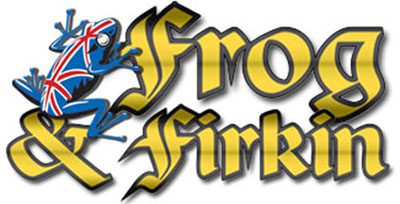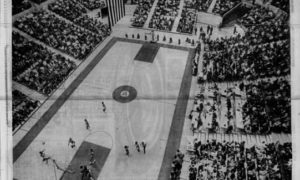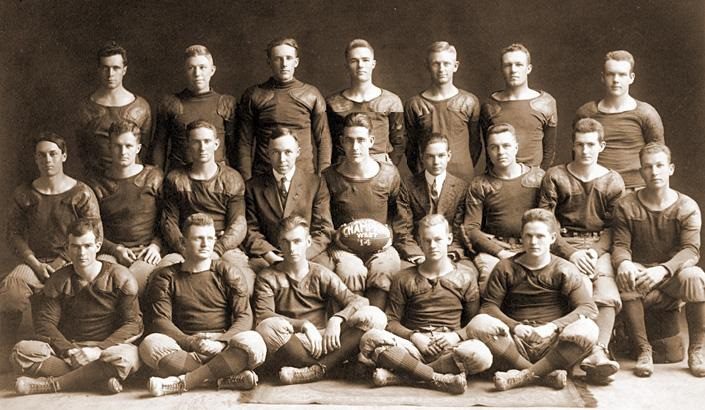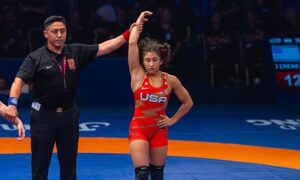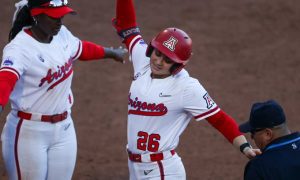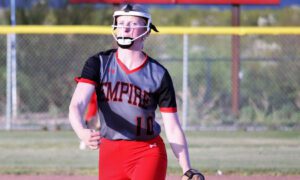[rps-paypal]
[ezcol_1half id=”” class=”” style=””]

SERIES LINKS
— General history
— Comparisons then and now
— Wildcats nickname
— Military service
— J.F. “Pop” McKale
[/ezcol_1half]
[ezcol_1half_end id=”” class=”” style=””]
Excerpt from L.A. Times, Nov. 8, 1914, authored by Bill Henry:
“Arizona’s cactus-fed athletes, despite heroic efforts on the part of their two halfbacks, (Asa) Porter and (Franklin) Luis, went down to defeat before the Occidental Tigers yesterday afternoon, the tally with all precincts heard from being 14 to 0 in favor of the Tigers.
Confident of rolling up a big score, the Tigers took the field with grins on their faces, but before the game was 10 seconds old they knew they had a battle on their hands.
The Arizona men showed the fight of wild cats and displayed before the public gaze a couple of little shrimps in the backfield who defied all attempts of the Tigers to stop them.”
This site will conduct a countdown in a 100-day period, leading up to Arizona’s 2014 football season-opener with UNLV on Aug. 29 at Arizona Stadium. The 100 Days ‘Til Kickoff countdown will include information daily about the historic 1914 Arizona team that helped create the school’s nickname of “Wildcats” because of how they played that fateful day against Occidental.
[/ezcol_1half_end]
[ezcol_1half id=”” class=”” style=””]

Orville McPherson’s nickname “Speedy” was given to him by J.F. “Pop” McKale (University of Arizona Library Special Collections)
James Fred McKale, who began his career as a coach and athletic director at Arizona in 1914, became famous and successful by doing things his way.
The son of a deputy sheriff in Lansing, Mich., McKale was a no-nonsense guy. He had fun on occasion, but even in those light-hearted times, he had a sense of purpose.
If he chose to call a player a certain nickname instead of by his real name, so be it. He had his reasons.
[/ezcol_1half]
[ezcol_1half_end id=”” class=”” style=””]
[/ezcol_1half_end]
Everything started and stopped with McKale, who ran all of Arizona’s athletic operations out of a small office in Herring Hall. He did not have a secretary or an assistant.
He was called “Pop” because he not only became the father of Arizona athletics, he was like a father to the young men on the 1914 roster and thereafter.
“Listen, to me, McKale was like God,” Warren T. Gridley, who played at Arizona in 1925 and 1926, was quoted as saying in the Abe Chanin book They Fought Like Wildcats. “He was a great coach and a great man.
“He just didn’t take from players, he gave to them.”

The 1914 Arizona football team that earned the honor of being named the first “Wildcats” was composed of (front row, left to right): Verne La Tourette, George Seeley, Leo Cloud, Richard Meyer, Asa Porter. Second row: Franklin Luis, Lawrence Jackson, Ray Miller, J.F. “Pop” McKale (coach), Turner Smith, Harry Hobson (manager), Orville McPherson, Albert Crawford, Ernest Renaud. Back row: Albert Condron, Emzy Lynch, Charley Beach, Vinton Hammels, Bill Hendry, George Clawson, Harry Turvey.
(AllSportsTucson.com graphic/Photo from University of Arizona Library Special Collections)
[ezcol_1half id=”” class=”” style=””]
Included in what he gave were nicknames. McKale was not a simple man, but he tried to keep things simple with how he addressed his teams, including the legendary 1914 group that provided the school the ultimate nickname of “Wildcats” because of their toughness.
Orville McPherson, who had some kick to him despite his designation as a fullback, was called “Speedy” by McKale. The nickname stuck. McPherson was called “Speedy” the rest of his life.
“(McKale) said he just couldn’t go around calling me Orville,” McPherson said in They Fought Like Wildcats. “And it was the same with those other fellows. Emzy Lynch became ‘Swede’. (Vinton) Hammels became ‘Brute’, and he began calling (Albert) Crawford ‘Bumps’.”
[/ezcol_1half]
[ezcol_1half_end id=”” class=”” style=””]
[/ezcol_1half_end]

J.F. “Pop” McKale in his first year at Arizona in 1914. He was only 27.
Lynch had a Norwegian background. Hammels, although he was listed at 6’1″ and 163 pounds, was one of the more physical players on the team at left end. Crawford was hard to take down as quarterback. He bumped off tacklers with the best of them.
One of the halfbacks who Los Angeles Times sports correspondent Bill Henry labeled as “shrimps” in the famed Arizona-Occidental game story, went by the name of Franklin “Lefty” Luis. Franklin was too formal of a name for McKale.
Players realized that if McKale called them by a different name it was something positive, or he did not want to bother with formalities.
It’s fitting that a man named “Pop” was basic like that. He built Arizona’s program from the ground up in his 43 years at the school with an authoritative style that worked.
“McKale believed in fundamentals and drilled them into us,” J. Prugh Herndon, who played for Arizona from 1917-19, said in They Fought Like Wildcats. “He was a coach who hated to lose. One time he said to me, ‘The University lost a debate; I don’t even like to lose a debate.'”
ALLSPORTSTUCSON.com publisher, writer and editor Javier Morales is a former Arizona Press Club award winner. He also writes articles for Bleacher Report and Lindy’s College Sports.






